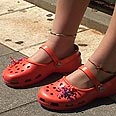
Leather is traditionally not worn on Yom Kippur as a symbol of humility and increased humanity on the atonement holiday.
The halachic ruling came in response to a question posed to the rabbi by a young yeshiva student asking whether it is permissible to wear on Yom Kippur shoes one would normally wear throughout the year. In response, the rabbi ruled it is best to avoid wearing Crocs on the holiday. "It is permissible legalistically, but it is inadvisable," said Rabbi Elyashiv.
The rabbi further explained his ruling saying that he ruled according to the halachic authorities who believe that the prohibition against "wearing sandals" refers to not wearing leather shoes.
Despite this, the rabbi added, he took into consideration the interpretation of halachic rulers who see the prohibition against "wearing sandals" as referring to creating a level of discomfort. As such, any shoe that is not from leather but is comfortable to wear is forbidden on Yom Kippur.
Rabbi Elyashiv's ruling will create a challenge this year for his students, many of whom have chosen in recent years to wear Crocs on Yom Kippur. Because worshippers spend most of Yom Kippur at synagogue for prayer services that include long periods of standing, Crocs have been a favored choice among synagogue-goers on the holiday and have gained popularity in the haredi sector because of the difficulty posed by standing through all the prayers.















